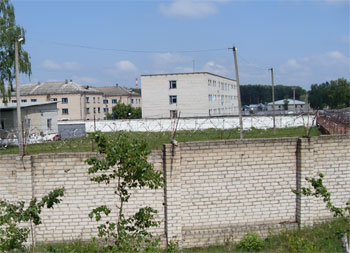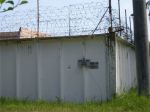Letters from activity therapy centers: how alcoholism is ‘cured’ in Belarus
In May 2009 the Belarusian government was charged to make proposals on extension of the net of activity therapy centers in Belarus, though five such centers already exist and in 2008 the number of the people who were kept there was about 4 000. But what really happens in these institutions? You can find it from the letters of those who ‘receive treatment’ there.
‘I want to tell what ATCs are in Belarus. In general, it is a prison, a copy of a penal colony for criminals, except for the 30% of those who work outside the ATCs (at collective farms and buildings sites) under the vigilant watch of the controllers from the ATC administration,’ writes Mikalai from Slutsk district. ‘I was in three such ATCs as an ill person (the ones in Svetlahorsk, Navahradak and Slutsk). As a rule, these institutions are hidden in the woods, on the territory of former military units of the USSR, where rocket units were situated.’
Even the official formulation of direction to ATC sounds cynical: ‘Sentenced to medical-social rehabilitation with obligatory drawing to labor’. And if you wouldn’t work – you have to spend some 10-15 days in the isolation ward. There is no any treatment from alcoholic addiction. They just give the tables of ‘metronidazole, which is an antibiotic, but people think they are cured this way. In fact, the medics put on the ritz to create the outlook of medical treatment. They invented the term ‘activity therapy’ and cure the people with physical labor. Sometimes it happens that when you come after one work, they tell you to go to another one, such as cleansing of the ATC territory, for free. It means that the labor legislation is completely ignored there. But if you refuse to work, you are sure to get at least five days in the isolation ward.
If you start explaining that you have no force, you have an ache or a chronic illness, they lead you to the ATC medics, who tell that ‘you cannot have such illness, because the inspector, who filled the paper for your direction to the ATC and the medics who examined you before it just closed their eyes to these illnesses, as the Ministry of Health Care prohibits directing those who have them to ATCs (according to ruling #55 of the Ministry of Health Care of 14 June 2006, including the illnesses with which one cannot be directed to and isolated in an ATC).
The regime and the incarceration conditions for those who work in the ATCs are humiliating. A person who was desperate enough to run home from there, would be caught and either beaten or fractured a leg so that other would fear to do it. Those who could not stand it and drank anything – are also beaten so that they would tell where they got the spirits (it is practiced in Slutsk ATC).’
Here are some excerpts from the letter of Siarhei, who has finished the ‘course of treatment’ at Svetlahorsk ATC this year:
‘It is a problem to buy anything in the ATC shop, because every brigade is given only four days a month for it. The shop works only three hours a day, that’s why on the payment day there gathers a huge queue. The choice of goods is poor, as it was during the perestroika times. There aren’t even any socks and trunks. One has to exchange them for tea or cigarettes.
I am working as a plasterer at a private firm. At present we are stuccoing the façade of a nine-storey house. The wage is scanty – about 10 000 a day. After the extraction of all payments and taxes we get a bit more than 2 000 (less than $1), which means 50 000 a month. It is said that earlier, in the Soviet Union, the wages in ATCs were decent: for a year one could earn several thousand rubles, which was enough for buying a Zaporozhec car, for instance.
Each of us renders about ten meters of walls a day. Sick leaves are not paid, as well as extra work. Somebody’s getting a good money on our work. However, there are even worse variants. For instance, those who work at the sawmill, are getting just 5 000 – 6 000 a month (about $2) …’
In fact, the main ‘treatment’ of alcoholics lies in the ‘activity therapy’, which means forced labor. But the isolated persons are not legally sentenced to imprisonment and have not committed any crimes! Their legal status is undefined, they are just ‘isolated’. As a result of such ‘treatment’, even according to the official statistics 25% of the ill return to the ATCs. There is no information about the percent of those who stays sober.
Human rights activists are convinced that the practice of direction of citizens to ATCs within the frames of civil, not criminal legal proceedings, is nothing else but arbitrary deprivation of freedom. According to the 1991 law the main task of the ATCs is isolation. Isolation is deprivation of freedom, which is possible only in the cases, provided by the law – the Criminal Code.
In practice ATCs look like usual penal colonies (some of them were even created on this basis), and are subordinated not to the Ministry of Health Care (which would be logical), but the Ministry of Internal Affairs.
Thus, ‘isolation’ of citizens in ATCs violates their constitutional right to personal freedom and immunity.
Human rights defenders believe that the ‘activity therapy’ with the aid of which those who are ill with alcoholism are ‘treated’ is nothing else but forced labor. In this case forced labor is not connected to imprisonment for a crime and violates the Constitution of the Republic of Belarus and international human rights acts, such as the International Covenant on Civil and Political Rights (Article 8).
Human Rights Center Viasna has already submitted its analysis of the legislation regulating the direction of citizens to ATCs to be analyzed by a number of international human rights organizations concerning the compliance with the international human rights standards.



















